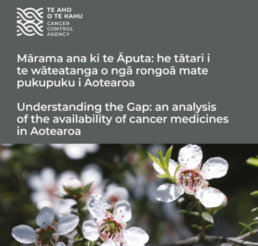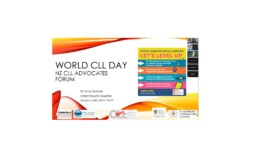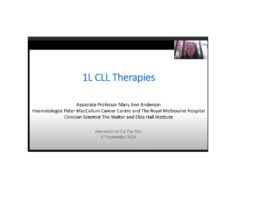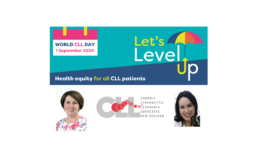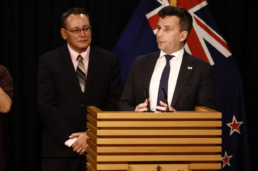Understanding IGHV Mutational Status in Chronic Lymphocytic Leukaemia (CLL)
This document here, IGHV Mutational Status Testing in Chronic Lymphocytic Leukaemia explains the role of IGHV mutational status testing in CLL and its impact on treatment in the New Zealand therapeutic landscape.
The IGHV mutational test checks how much the DNA in a specific part of the immune system's gene has changed in a group of Chronic Lymphocytic Leukaemia (CLL) cells compared to normal, healthy DNA. This helps doctors understand how the cancer might behave and what treatment options are best.
IGHV mutational status is a factor in determining the prognosis and treatment options for patients with Chronic Lymphocytic Leukaemia (CLL). Testing for IGHV mutations helps classify CLL into two categories: mutated or unmutated, influencing both the disease’s progression and response to therapy. This valuable information aids doctors in creating personalised treatment plans, improving patient outcomes.
Introduction to IGHV Mutational Status Testing in CLL
This paper here, IGHV-Mutational-Status-Testing-in-Chronic-Lymphocytic-Leukemia.pdf explores in greater depth the role of IGHV mutational status as a biomarker in chronic lymphocytic leukaemia (CLL). By predicting patient outcomes and informing treatment choices, IGHV testing helps guide decisions between chemoimmunotherapy and novel therapies.
Cancer Control Agency releases analysis on funding of cancer drugs in Aotearoa
A new report, Understanding Blood Cancer Medicine Availability in Aotearoa New Zealand, has been released, examining the disparities in publicly funded blood cancer medicines between Australia and New Zealand.
This follows the 2022 report Understanding the Gap, which analysed the availability of general cancer medicines in Aotearoa.
Key findings from the 2024 report show that, as of January 2024, 24 blood cancer medicines were available in Australia but not in New Zealand, covering 42 treatment indications. Among these, 12 had substantial clinical benefits, including two intended to cure blood cancer.
However, since the report was conducted, Pharmac has funded four medicines, reducing the gaps to 36.
The report identifies remaining gaps for cancers such as acute lymphoblastic leukaemia (ALL), acute myeloid leukaemia (AML), and chronic lymphocytic leukaemia (CLL), and mentions Pharmac's ongoing considerations to fund some of these treatments.
You can find a full and summary version of the report, along with frequently asked questions on their website
Advocating for Better Access to Modern Medications for CLL
CLL Trustee, Dr. Ruth Spearing features in this One News interview explaining why New Zealand lacks funding for modern medications, which restricts access to the latest treatments and prevents the country from meeting international standards of care.
Although Pharmac, New Zealand’s drug-buying agency, recently expanded access to certain blood cancer treatments, it operates under a constrained budget.
New Zealand's spending on medicines is less than a third of what other countries invest.
The call is for more funding to improve access to updated treatments and reduce long-term healthcare costs.
Jodie White, who was diagnosed with chronic lymphocytic leukaemia, shares her experience of moving from chemotherapy to a clinical trial for a new treatment that has no side effects, dramatically improving her quality of life.
We are grateful to Ruth and Jodie for advocating to improve treatment options for CLL.
https://www.loom.com/share/17ee4a215fba4868a42f887961b627f6?sid=3b4774e9-9897-412a-9f27-b07268667629
World CLL Day Webinar
Our webinar, held on World CLL Day, September 1st, featured an engaging and informative agenda focused on Chronic Lymphocytic Leukaemia (CLL).
Hosted by Dr. Ruth Spearing, the event began with an introduction highlighting the significance of World CLL Day and its importance to the global CLL community. Dr. Amy Holmes led the main presentation, which aimed to clarify complex data, discuss the latest research findings, and explore their implications for CLL patients. She provided practical insights into managing CLL, addressing pre-submitted questions and engaging with live queries from participants, ensuring a dynamic and interactive discussion.
You can access the full recording at your convenience. We encourage you to explore the content and share it with anyone who may benefit from the information presented. Here is the link: 1st September Webinar recording
We sincerely thank all the attendees for their participation, thoughtful questions, and contributions to the discussion.
We invite everyone to explore the resources provided on our website and reach out to CLL Advocates NZ for further information, support, or to stay connected with our community and upcoming events. Your feedback and engagement help us continue to offer valuable content and support to all those affected by CLL.
CLL Advocates Webinar 1st September 7.00pm
CLL Advocates Webinar
Please register in advance for the webinar: CLL Advocates webinar 1st Sept 7pm
After registering, you will receive a confirmation email containing information about joining the meeting.
Dr Amy Holmes, Medical Advisor to CLL Advocates NZ and Dr Ruth Spearing, Trustee of CLL Advocates NZ will lead this discussion from 7pm this Sunday, September 1st.
A/Professor Mary Ann Anderson, a highly respected CLL expert from the Peter Mac, the Royal Melbourne and the WEHI research Institute has kindly prepared a pre-recorded talk for CLL Advocates NZ to mark International CLL Day which is this Sunday 1st September.
The talk is excellent but contains a lot of data, so we thought it would be beneficial for everyone to review it at their own pace this week and then use the Webinar to address any questions that arise.
If you would like to view the recording of Mary-Ann’s talk, either register for the Webinar and the link for Mary-Ann’s video will be sent automatically to you, or please email: clladvocates@outlook.co.nz to request the link.
We look forward to seeing you online!
Sunday, September 1 World CLL Day Seminar
Mark your calendars!
Sunday, September 1, is World CLL Day.
To commemorate this day and provide valuable insights for those affected by CLL and our families, we invite you to join a special webinar from 7:00pm to 8:15 PM. The session will begin with an introduction by Amy Holmes, our Medical Advisor and a haematologist at CDHB, followed by a prerecorded presentation by Mary Ann Anderson, a clinician scientist at the Peter MacCallum Cancer Centre and the Walter and Eliza Hall Institute of Medical Research (WEHI) in Melbourne.
She will discuss the latest advancements in CLL treatments. Afterward, Amy will host a Q&A session.
Stay tuned for the Webinar link, which we will share in the coming weeks.
David Seymour's ‘whole of society’ plan for tipping millions of dollars more in to Pharmac - and Big Pharma
David Seymour, ACT leader and the minister in charge of Pharmac, is advocating for a significant transformation of Pharmac’s funding model. He proposes a “whole of society” approach, which assesses the broader societal impacts of funding or not funding medicines, rather than just their upfront costs. This model aims to justify increased government spending on pharmaceuticals by demonstrating potential savings in other areas, such as healthcare and welfare.
Read more here: David Seymour - Pharmac and big Pharma
Expressions of Interest for CLL Advocates positions
These are exciting times for our CLL community as the 'patient voice' becomes an essential factor in determining which drugs receive funding here in New Zealand. We are currently seeking at least one more patient trustee to join our team. While the time commitment is minimal, a strong passion for our cause is highly valued.
At our recent CLL Advocates Trustees meeting, we decided to establish a patient working group, which Diane Ward, a CLL Advocates Trustee, is enthusiastic to lead. This initiative aims to enhance patient input in our advocacy efforts.
World CLL Day is on September 1, a day that holds significant meaning for all of us. We need your support to spread these important messages to as wide an audience as possible. If you are interested in becoming a trustee or a member of the working group, please complete the form below and submit it by 10th August 2024.
Expressions of Interest for CLL Advocates positions
More blood cancer drugs move falls short, says Dr Rodger Tiedemann
Close to 4000 people with blood cancer and blood-related disorders are expected to benefit from a move to buy more medicines, but a haematologist says New Zealanders will continue to die early until more modern medicines are funded.
Dr Rodger Tiedemann said the announcement reflected "one small step for patients, one giant deal for Pharmac,".
Read more here: here
New medicine funding something to celebrate - but there’s a long way to go
Rodger Tiedemann, an associate professor of medicine at the University of Auckland and a consultant haematologist with Auckland Hospital’s cancer and blood service, highlights the critical underinvestment in modern medicines in New Zealand.
He commends the coalition Government's recent pledge to allocate $642 million over the next four years for new cancer treatments and non-cancer medicines, which is expected to benefit thousands of New Zealanders.
However, he underscores that despite this investment, New Zealand remains significantly behind other OECD countries in medicine reimbursement, reflecting chronic underfunding. This gap has led to limited access to life-extending and curative treatments, necessitating further substantial investment to bring the country's healthcare up to par with global standards.
Read the full article here

